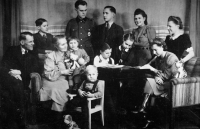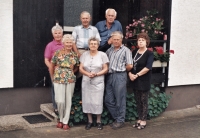They evaded deportation, but their house was taken and looted by a revolutionary guardsman

Download image
Jan Moudrý was born as Hans Moudry on 1st May 1938 in Frýdlant into a German family. His father experienced the First World War in the service of the Austro-Hungarian army as a telegrapher and cartographer. His parents had a total of ten children and often lived in difficult conditions between the wars. The mother and children temporarily fled to Germany during the heated situation in the Sudetenland in 1938. During World War II, two of his brothers served in the Wehrmacht, one as a filmmaker and documentary filmmaker, the other as a telegraph operator, who got captured by the Soviets. At the end of the war, the witness and his four siblings had to board a transport that took children away from the advancing front; they managed to escape from the transport. The family had to move out of the house immediately after the war on the orders of a member of the Revolutionary Guards, who took the house for himself and ransacked it. In 1947, they were exempted from deportation, and their father was requested as a furniture-making expert. Some siblings left for the GDR, some emigrated to the German Democratic Republic, and the family could no longer gather together. Because of his German origin, the communists forbade the witness to study any high school, so he trained as a cook. As a non-partisan, he was involved in trade unions and civic committees and was active in the Czech Tourist Club and the Baráčník Association. In 2023, he lived in Frýdlant. The story of the witness could be recorded thanks to support from the town of Frýdlant.








